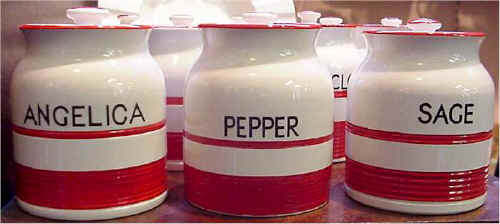SPICE JARS

These
lovely old china jars have the names of cooking ingredients
printed on them.
The
jars were made in Britain by a company called James Sadler and Sons. On
the base it is marked ' Kleen Kitchen Ware, Sadler. Made in England.'
The design and colour is typical of the 1950's.

Yasuko
asked me if it is normal to have 'Made in England' printed on the base of china.
'England' is normally only found on ceramics made after 1891 and 'Made in
England' only appears after 1920. Not all china has the 'Made in
England' mark.

The names on the
above jars are not easy to read.
They say 'mixed herbs' and 'baking powder'.
Whilst
I was taking these photos in an Antique Centre a friend walked past and
remarked to me that he did not know what angelica was. I have used it to
decorate cakes and trifles but was not entirely sure either! Apparently
it is a large native plant with a distinctive flavour and medicinal
uses. You learn something new every day!
Kitchenalia,
as objects of this type are called, is currently very collectable. The
word just refers to any type of object connected with kitchens. These red jars would
look very cheerful in a kitchen.
 |
|
Blue
and white china articles made by a company called Cornish Kitchenware
are also very popular with collectors. When
you have finished reading this current article why not click on this
image to see these blue and white jars.
|
| you
learn something new every day
|
An
expression that often used slightly humourously in situations where you
learn some surprising or unusual new information. |
|
| baking
powder |
This is a
raising agent that is used as a substitute for yeast when baking cakes.
It is a powder that contains bicarbonate of soda and starch. |
|
| mixed
herbs
|
In Britain
you can buy individual jars of dried savoury herbs or a single jar
containing a mixture of herbs for use in dishes such as casseroles. The
jar of mixed herbs in my kitchen cupboard contains thyme, marjoram,
parsley, oregano, sage and basil. |
| 